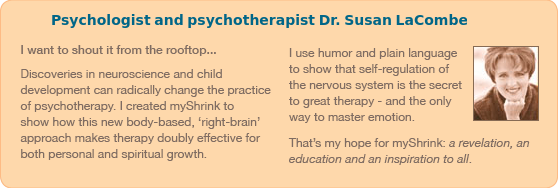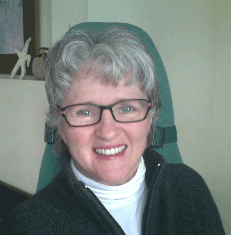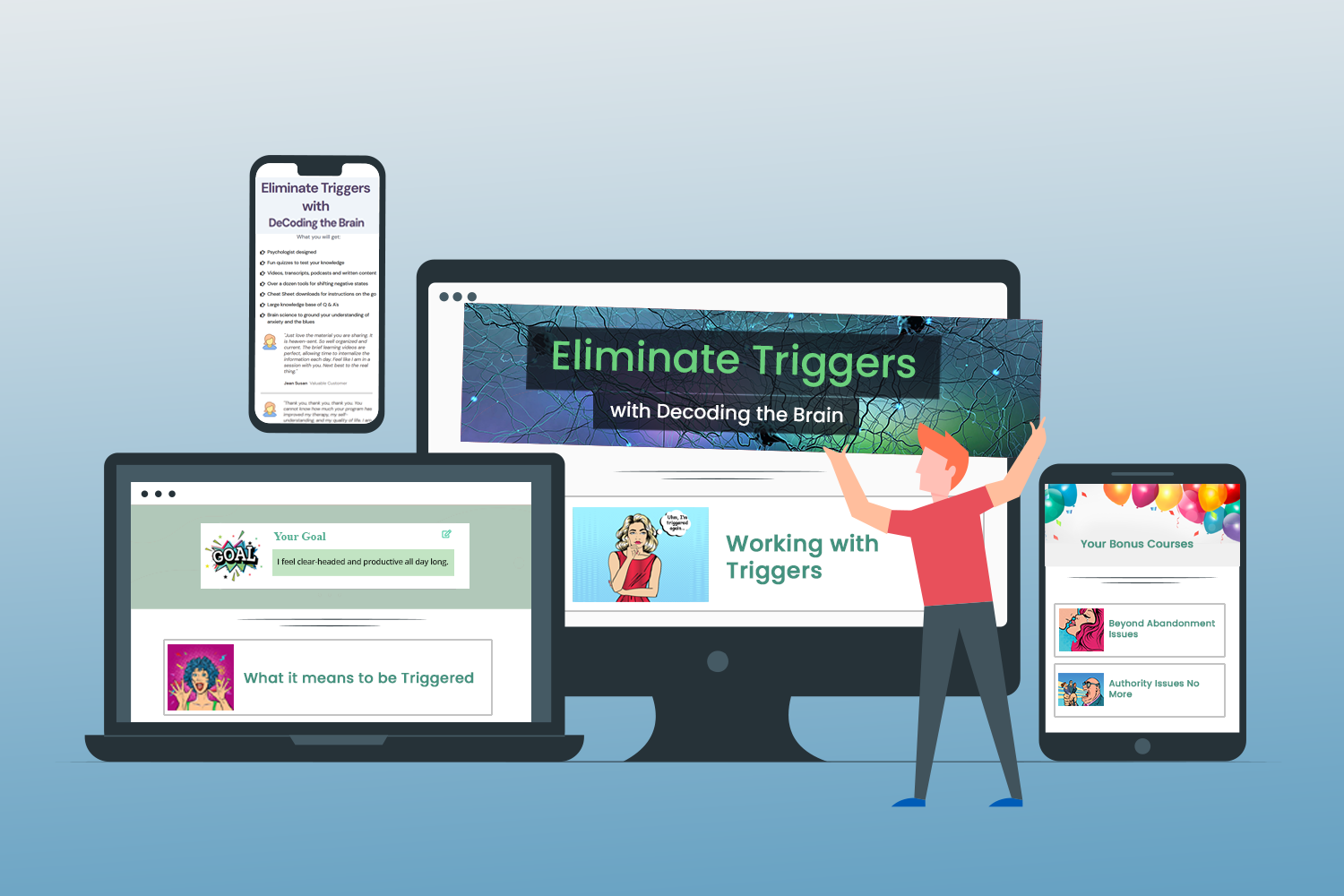Creating a corrective emotional experience is the last step in resolving and taking the charge out of a deep wounding trigger
—it's also a creative experience that you can literally create on your own!
What is a corrective emotional experience?
August 24, 2024
When I was in graduate school the term "corrective emotional experience" was most often used in reference to the repair of a misunderstanding between the therapist and the client.

Dr. LaCombe, Rebel Shrink and Psychologist
We called these misunderstandings, "misattunements" because somewhere along the line, the therapist failed to "attune" to the client.
Misattunements included misinterpretations and mistakes on the part of the therapist.
You see, "attuning" to a client is a bit of an art.
In response, the repair might take the form of an apology. Maybe your therapist misunderstood your comment and took the time to clarify.
Or maybe you needed to hear a comment or reflection that deepened the therapeutic relationship.
Traditionally, a 'corrective emotional experience' refers to a unique and healing interaction with your therapist that creates a fundamental shift, a true insight moment.
Afterwards you feel different. You've changed.
A modern 'corrective emotional experience'
However, today I encourage my clients to have corrective experiences and few have to do with our relationship. They have more to do with their previous relationships.
You see, if you evoke a memory from the past - right in that moment - the brain is accessing the same arousal pattern or similar charge that was associated with it originally. For most people, all they have to do to evoke the memory - is to begin talking about it.
In other words, by talking about that past event you're re-exposing yourself to that same or somewhat the same angst associated with the memory.
Here comes the best part . . .
Then if, at the same time, you evoke a positive experience, you're literally helping the original memory by "softening" it up with the new one.
Hence, a corrective emotional experience!
Corrective experiences outside therapy
Chances are you're having a corrective emotional experience when you open up to your best friend and share the details of a harrowing event.
You see, you can't access a memory from the past without changing it in small ways by virtue of the fact that you're now, adding in the present.
As you tell your story your brain is taking in the positive vibes of sitting with someone you trust, someone who cares about you. Those positive feelings are changing - albeit in small ways - how you experience the memory of that harrowing event.
A client misunderstanding has a happy ending.
Let me share my experience with a client that illustrates how misunderstandings can serve as opportunities for corrective emotional experiences.
Because of her work schedule my client was not able to set a fixed date for her therapy appointments. As she was also aware of my 24 hour cancellation policy, she couldn't fix a time for an appointment because she didn't know when she would be working.
This was distressful for her, and she would often remark that she really wanted to set another appointment time (i.e. to guarantee a spot) but couldn't.
Attempting to ease her concerns I told her that "it didn't matter" because I knew that I'd almost certainly be able to accommodate her request given my schedule.
Problem is, I knew my situation was flexible but I had failed to communicate this information to my client.
Unfortunately, yet understandably so, she interpreted my remark as if I had said, "it doesn't matter to me - I'll fill the spot if you take it or not."
Thankfully, she had the courage to raise the issue with me and relate how badly she had felt when she heard my words.
Taken aback by the realization that I had a role in my client's distress, it took me a few moments to grasp the emotional significance of her words.
When I finally understood, I apologized for being insensitive to her feelings and then said encouragingly, "I hope an appointment is available for you as I see that it's important to you." She smiled and replied that this was exactly what she needed to hear from me.
In a later session she told me how important it was that I had clarified my position in a way that was non-judgmental. It had touched her that I had cared enough to learn exactly what she needed. She added that something had shifted within her and from that moment on, she felt a deepening in our relationship.
And on my end, I was personally grateful that she had taken that step. It warmed my heart to know she had placed enough trust in me to risk resolving it together.
Why are corrective emotional experiences important?
Because this client had the courage to reveal what was emotionally important to her, she learned that some conflicts can be successfully resolved, and that relationships can be repaired.
The shift that she experienced happened at a non-conscious, right brain level and likely signified an increase in self-esteem and self-assertion that could carry over into her personal relationships.
It is important to understand that this isn't about thinking differently although this may occur. What's important is that her automatic responses are open to change. For example, it is very likely that she may feel a little more trusting of herself and others.
Corrective emotional experiences are not exclusive to a therapeutic relationship. Our connections with significant others are just that -- significant. They have the same healing potential.
note to parents and therapists
Many therapists believe that misattunements between therapist and client parallel the natural and inevitable misattunements between the infant and mother. In both relationships, reestablishing attunement requires reengagement, a return to the rhythms of the dance in which the mother, or therapist, remain open to renewal.
related topics
Attunement with clients
Why emotionally corrective experiences are important
How to be present in the moment
Reenacting the same mistake

Readers Comments

Anonymous
What kind of work might need to be done with a client to prepare them to take these risks?
What kind of work might need to be done with a client to prepare them to take these risks?

Shrinklady
How do you prepare to ask for what you need?
Well, here's the conundrum Secret Agent Girl...it's pretty hard to prepare to be where you have not yet arrived.
That's actually a good chunk of what therapy is all about. Asking questions like, "does this work or doesn't work for you" of your therapist is huge. If clients can let the therapist know about a misattunement, then they're already in a better place to express themselves and assert their needs outside of therapy.
It's so helpful for clients to know that they are consumers…that they have choices. And while they may struggle with the power difference in the therapeutic relationship, the therapy is ultimately theirs to agree to.
The short answer is that ultimately, whether or not you take a risk, depends on the relationship between you and your therapist.
There's no losing. No matter how we take a risk, we're further ahead.
Therapist: "You seem irritated by what I just said."
Client: "Ah, yes."
Therapist: "How was it for to tell me?"
Client: "Well, I don't think I would have said anything unless you asked so I guess, I'm glad you asked but it was kinda hard to tell you."
To:
Therapist: "You seem irritated by what I just said."
Client: "Ah, yes."
Therapist: "How was it for to tell me?"
Client: "Well, if I can't tell me therapist how I'm feeling than what am I doing here?" (Note the empowerment in this statement).
Hope that answers your question, secret agent girl,
Shrinklady


